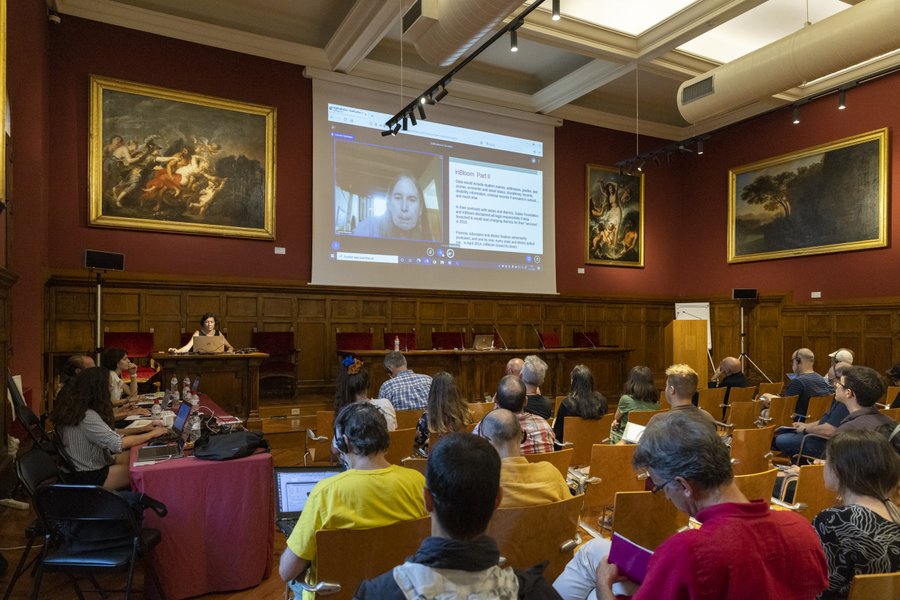 by Cindy Eckard
by Cindy Eckard
www.screensandkids.us
@screensandkids on Twitter
Children using digital devices are at risk for several impacts to their health, especially myopia, obesity, sleep disruptions and addiction. While social media is currently the focus of politicians and many children’s health advocates, my concern has always been the schools’ increasing demands for digital device use among growing children. Since it is the schools’ duty of care to avoid known harms in a learning environment, and since OSHA (Occupational Safety and Health Administration) has regulated the hazards posed by computers in the workplace since the 1990’s, I contend that the risks are well known, and should therefore be avoided. Especially among children.
Background
School is the child’s workplace, but students have no workplace protections from documented health hazards. Children are forced to use a consumer product – a digital device – with no consumer product protections. The notion that ‘recreational’ screen use should be limited, while equally hazardous educational use is encouraged is simply craven. Students’ health should not be traded for an education. Sedentary behavior is sedentary behavior whatever the setting.. Near work on a screen contributes to myopia regardless of the content, and blue light affects children’s sleep patterns no matter what they’re viewing. “Educational” screen use has been given a pass for far too long.
The myriad health risks children face are actually worse than those facing adults because kids are still growing. Their eyes are still changing and so are their bones and brains. Many of the chronic impacts of daily screen use, such as high myopia and obesity, can introduce lifelong health issues, including glaucoma, diabetes, and heart disease, so prevention of the original conditions is critical. There is good news however: research has shown that simply getting children back outside on the playground can help them avoid many of the health impacts introduced by the schools’ demands for more screen use.
But the increased demands for online classwork have displaced recess and outdoor play in many schools, so students are twice denied a healthy learning environment. Unlike social media, students have little or no choice when it comes to the use of school devices. Not only are they required to sit indoors tethered to a screen (increasing sedentary behavior and visual near-work) but they are also denied the time outdoors that decades of research shows is necessary for the healthy development of their bodies, brains, eyes and vision. They are, essentially, required to hurt their own health, because of the growing demands placed on them from their schools to sit inside and stare at a screen.
New Louisiana law follows Maryland, Virginia and Texas
So in 2016, I approached my Delegate to the Maryland General Assembly and he agreed to sponsor a bill that would protect students’ health from the impacts of the schools’ requirements for digital device use. It took two years, but in 2018, the first bill of its kind in the country passed unanimously in both the Maryland House and Senate and the governor signed it into law. Two years after that, using the Maryland law as a guide, Virginia passed the second law, providing health and safety oversight of classroom digital devices. The following year, a Texas mom who had been following the Maryland legislation was busy getting a similar one passed in her state as well.
The most recent effort in Louisiana, the 4th state to pass a law creating health and safety guidelines for the schools’ digital devices, was also the 4th mom-led effort. Dr. Holly Groh, an ophthalmologist, mother of four, and community leader in New Orleans, contacted me to see if we could get a law passed there, similar to the others. It took another two years to get it passed, but the new Louisiana law, sponsored by Representative Aimee Adatto Freeman, continues to improve student protections.
Remote learning impacted children’s health, increasing both myopia and obesity, especially. And in Louisiana, where obesity rates were already high, the urgent need to address the health impacts of the schools’ devices was made very clear to the General Assembly. The committee testimony was compelling, and included dramatic artwork created independently by high school students who used their art to illustrate how physically and mentally uncomfortable the daily use of the schools’ devices had made them.
Medical experts round out Louisiana work group
The most important aspect of the Louisiana law was the establishment of a work group comprised of children’s health specialists in a variety of fields, to work with the Louisiana Board of Education and the Department of Health and create a set of medically sound school health and safety guidelines. Experts in eye health, children’s vision, sleep, obesity, orthopedics, pulmonology and cardiology all contributed to the dialogue, to ensure that the schools’ devices will be used in ways that minimize health risks to the students.
The Louisiana health and safety guidelines created by the work group, were just released. A key recommendation in the new guidelines is the distribution of the digital device manufacturers’ health and safety warnings, to help families better understand the health risks of the devices themselves. These warnings are usually not provided to the students or their families when the devices are distributed by schools, even though they are included in the original product packaging. The law further requires annual review of the guidelines, to ensure that the student protections reflect the latest medical insights and research.
Additional recommendations include:
– increasing recess and time outdoors
– ensuring safe ergonomic configurations of the equipment
– staggering the use of devices throughout the school day to provide scheduled breaks
– setting proper audio levels
– not using devices during recess
– not using devices after dark
– a link to Louisiana’s substantial 16-page student privacy guidebook
Moving forward
There is a simple lesson to be learned from the passage of these laws: schools have been failing in their legal obligation to protect students in their care. Schools systems – guided by the U.S. Department of Education’s Ed Tech plans – never performed any risk analyses on the health impacts to growing children required to use these devices every day. Children are now paying the price for this lack of due diligence with their health: obesity and myopia are both now at epidemic proportions while most school systems ignore their duty of care. So legislative action has been needed.
It shouldn’t take the passage of laws to get kids protected, but at least now those parents who are motivated to take action have examples they can draw upon, to illustrate the need for health and safety oversight of the schools’ equipment. The next state general assemblies will be easier to convince, with this growing list of legislative wins, and sadly, with the growing evidence that children have been negatively impacted.
But if you’re not ready to head to the state capital, perhaps the best place to start is with your own kids – make sure they have a complete dilated eye exam. Make sure they spend more time offline and outside. And ask your school’s leadership what steps are being taken to provide healthy and safe practices for your child’s use of school equipment.

